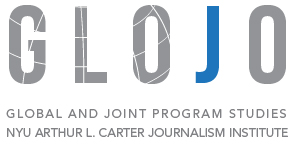About GloJo

For a real-time sense of the GloJo experience, follow us on Twitter and on Facebook, where we regularly post links to our faculty’s and students’ news, bylines, and achievements, as well as photographic reports of our gatherings, celebrations, and student experiences in the field.
A select group of students each year have the opportunity to work toward a joint M.A. degree in Journalism along side Africana Studies, French Studies, Latin American and Caribbean Studies, Near Eastern Studies, Russian and Slavic Studies, European and Mediterranean Studies, East Asian Studies or International Relations. This program is known informally as

By design, GloJo crosses disciplines and media platforms and just as intentionally remains small. It is expressly for students with strong international or transnational interests, background in specific area studies, and, as appropriate, the needed language preparation. The program provides the opportunity to deepen knowledge of each respective region, culture, or discipline as it opens opportunity for careers in journalism and any number of related fields. On the Journalism side, the focus is intensive preparation in research, reporting, and writing in all journalistic genres along with professional-level advancement in the use of multimedia techniques and tools.
The Curriculum link takes you to a typical course progression through the two-year program and, just below that, you’ll find the requirements for graduation by unit. These differ somewhat from partner program to partner program.
Only one application is needed, but the admission process, because two departments are involved, has two steps. The partner programs review the applications first and GloJo after that. For admission to the joint program, both departments must say yes.
From the very start, GloJo students take their required two Writing, Research and Reporting classes together, WRR I in the first term and WRR II in the third. This helps intensify our supervision of the forthcoming thesis. At the same time, students are advancing in their reporting and writing skills, from spot news and features to explanatory journalism and news analysis to long narrative form. We also emphasize multimedia skills training.
The two required WRR classes also help ensure group cohesion within the larger Journalism graduate program and emphasize GloJo’s international inflection. Two or three subject-area reporting electives, or two plus a specific skills course or seminar, round out the five journalism courses that lead to the journalism side of the degree. Internships can be taken for 0 to 4 credits (here is where our students intern and work), including as paid staff for Latin America News Dispatch, a joint project of GloJo and the Center for Latin American and Caribbean Studies.
We endeavor to limit each entering GloJo group to no more than 15 students in total. The first and second year groups gather regularly outside of class for informal monthly events expressly conceived to enhance networking potential and to support degree progress and master’s projects preparation. We celebrate, too. These events sometimes involve guests from the working world and our recent alumni to enable the further sharing of experiences, expertise, information and professional and academic contacts.
Here you can see where our students are interning and where some of our recent graduates are working. Don’t miss our Collaborations page, which highlights media partnerships with GroundTruth/GlobalPost, “Global Beat,” organized by the Bureau for International Reporting. You will also find evidence of outstanding GloJo entrepreneurship that our students generate, such as the the New York TransAtlantic and Latin America News Dispatch, which is distributed on its own site and through NPR’s Latino USA and often carried by other outlets with Latin America and Caribbean interests.
GloJo students regularly have been invited on the journalism department’s “Global Beat” trips during the spring semester. Past locations include Morocco, Senegal, Cambodia, Ukraine, Northern Ireland, and Peru, all of which produced PBS NewsHour segments. GloJo students generated their own individual work from these trips for other outlets, too. Our Facebook feed has all the PBS links going back to 2015, as well as our almost daily posts about publishing by alumni and students still in the program.
Check our future events and past events calendars to get a sense of the who’s-who of journalism who pass through the doors of the Carter Institute week after week.
The master’s project (here you can find some recent abstracts) generally involve extended summer travel between the first and second years of the program. The Journalism Institutes support well developed proposals with modest GloJo travel grants, as do some of the partner programs. Students prepare for these reporting trips (they last anywhere from three weeks to three months) during their first two semesters in the program. Well before they travel, students enlist two faculty mentors, one from Journalism and one from the partner program. The students do significant advance preparation.
Thesis reporting continues after the summer. Early drafts are workshopped during the advanced GloJo reporting class in the second fall. The writing period usually continues well into the second spring, although at least three students have managed to complete the thesis by as early as the end of their third semester in the program. The research and reporting results in a substantive long-form (6,500-10,000 words) journalistic work in narrative, explanatory or investigative style, under-girded with academic references. In recent years, several students have produced documentaries, photographic essays, or multimedia projects such as this one from 2011 or this one, which NPR aired in 2013 or this one which NPR aired in 2015. Some partner programs will accept this work as the final MA project; others will require a more traditional academic thesis in addition. Again, this varies from partner to partner.
See our Master’s projects page for a sense of the masters projects past. Note how many have appeared in near-entirety, or in substantial excerpt, in the Atlantic, Time, Foreign Policy (twice), the New Republic (twice), Buzzfeed Longform, the BBC, the Baffler, Dissent, World Politics Review, the Miami Herald, Huffington Post, the Boston Review, Harper’s Magazine, Al Jazeera America, the Seattle Times, City Limits, Tablet (three times ) GlobalPost.com (twice), in VQR (twice), Brooklyn Quarterly, Quartz, Jacobin (twice), on NPR’s Latino USA (twice and thrice) and produced as a radio segment by the author for NPR’s “Morning Edition.” and this one for NPR‘s “Latino Voices.” Throughout the two years of the program, students are encouraged to publish professionally as part of the learning experience. Join our Facebook page for almost daily updates as to what our students, alumni, and faculty are up to, and where and what they are publishing. A small selection of published work also appears on this site under Student Work just below.
By all means subscribe to the full feed from GloJo Alumni on Twitter.
To learn even more about the program, prospective students are not only invited but encouraged to visit the Institute during the fall and spring academic terms. We can arrange for you to sit in on a class and suggest you check Course Listings for classes that coincide with your visit. Please note that if you wish to meet with faculty, visits should be scheduled well in advance. If you can, plan to be or happen to be in town for a scheduled GloJo gathering, we’d be delighted to invite you to one of these as well. It’s a great way to meet current students from both Years One and Year Two and to get a real sense of this remarkable community. The 2018-19 dates are listed below. In all cases, please email global.journalism@nyu.edu for a personal invitation and time and location details.
Please note the final annual deadline for application submission is the end of the business day January 4, including all scholarship consideration, so do get all of your documents in by no later than this date. The volume of applications and the dual-department review makes it almost impossible to consider late submissions. We encourage applicants to think early about applying for external funding opportunities (NYU has a complementary Tuition Incentive Program) and to study this page for ways of and resources for financing graduate education.
Please write global.journalism@nyu.edu for full details and an invitation to any of the above programs.